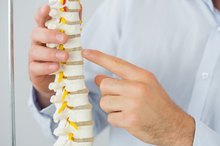What Are the Symptoms at the End Stage of Lung Cancer?
End stage or advanced lung cancer is a deadly disease. The median survival following diagnosis of advanced lung cancer is eight to 10 months, according to the Surveillance, Epidemiology and End Results database.
Types
The most common symptoms of advanced, late stage lung cancer include weight loss, pain in bones, constipation, early satiety, dyspnea, lack of energy, fatigue, weakness and anorexia, according to a 2000 article published in the journal "Supportive Care In Cancer."
Symptom Prevalence
Symptoms of Lumbar Hemangioma
Learn More
Most of the symptoms of advanced lung cancer listed are present in 50 to 84 percent of patients at the time of diagnosis, according to the study published in "Supportive Care In Cancer." Weight loss of more than 10 percent occurs in 50 percent of patients.
Considerations
Patients with end-stage advanced lung cancer tend to have multiple symptoms at the time of diagnosis, according to the book "Clinical Oncology." This is referred to as polysymptomatic.
Less Frequent Symptoms
Early Bone Cancer Symptoms
Learn More
Other less frequent symptoms of advanced lung cancer include diarrhea, blackouts, itching, tremor and aches. Blackouts occur in 3 percent of patients diagnosed with advanced lung cancer, according to the study published in "Supportive Care In Cancer." Blackouts tend to be associated with younger patients.
Expert Insight
Most patients will experience pain either in the chest, bones or other parts of the body, according to the book "Clinical Oncology." Bone pain is due to the presence of metastatic lung cancer in the bone. Chest pain is due to the growing tumor pressing on one of the large veins in the chest. Headaches are due to the presence of metastatic lung cancer in the brain.
Related Articles
References
- Surveillance, Epidemiology and End Results (SEER) database: Lung Cancer
- "Clinical Oncology," Abeloff et al., 2007, Elsevier
- "Supportive Care In Cancer": The symptoms of advanced cancer: relationship to age, gender, and performance status in 1,000 patients, Walsh et al., Volume 8, Number 3/March, 2000
Writer Bio
Dr. Tuan Dinh has 10 years of experience in writing and publishing in science and medicine. He obtained a Ph.D. degree in chemical engineering from University of California, Santa Barbara and a Master of Science degree in mechanical engineering/nuclear engineering from Royal Institute of Technology, Stockholm, Sweden.









